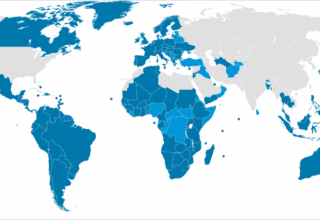
The recent imposition of extensive import tariffs by the United States, labeled “Liberation Day” tariffs, has marked a decisive turning point in international economic policy with far-reaching implications for global trade as well as diplomatic relations. Imposing a base-rate tariff of 10% on all imported products, as well as much higher tariffs on a chosen portfolio of sectors, marks a direction toward protectionism when the global economy already faces inflationary stresses and dislocations in the global supply chain. While the U.S. administration has backed the move as a policy aimed at increasing the competitiveness of domestic industries and breaking dependence on foreign manufacture, the implications run far wider than across the national border, upsetting the stability of long-standing alliances and reorganizing economic interdependence.
A key consideration among the derived consequences of the new tariffs lies in the prospect of retaliation against key trading partners, in particular the European Union, China, and Canada. History indicates that sharp tariff policy may lead toward the outbreak of trade wars, as evidenced by the U.S.-China tariffs escalation between 2018 and 2019. In the majority of cases duplicative tariffs lead to dislocations in the global supply chain, higher prices for consumers, and strained diplomatic relations. Further, the global orientation of modern industries, especially in technology, manufacture, and fashion, ensures that sudden barriers will be conveyed as significant economic uncertainty. For instance, sectors reliant on raw materials and component parts sourced internationally may face production decreases and added expenses, which would result in diminished competitiveness rather than increased economic insularity. Aside from economic implications, the tariffs present a test for international alliances that have been a cornerstone in maintaining geopolitical stability in the last century. Traditional partners of the U.S. such as the European Union and Australia have already expressed concerns and criticism over the unilateralism and magnitude of these measures, cautioning that such protectionist economic choices would lead to the erosion of confidence and collaboration. In this era when international coordination becomes essential in the face of challenges such as climate change, international standardization of technology, and global security threats, a protectionist response risks to alienate partners who have been long-term economic and strategic allies of the United States.
In order to counteract the negative impacts of tariffs and sustain global economic stability, it is necessary to consider and develop pragmatic policy revisions. Firstly, the U.S. government should attempt to create a systematic framework for negotiations with vital commercial partners in order to preclude retaliatory escalation, given that bilateral and multilateral discussions can achieve negotiations on selective exemptions, industry-specific adjustments, and joint industrial policies that could benefit all parties. Secondly, the U.S. should aim to introduce tariffs in phases so that businesses and consumers have sufficient time to adapt to changed economic realities. This gradual implementation could avoid sudden economic shocks and provide companies space for re-focusing their supply chain more effectively. Lastly, the U.S. should seek other alternatives in reinforcing national industries instead of taking the route of blanket protectionism. Investments in infrastructure, innovation in technology, and human resource development can make the nation more economically robust while maintaining prosperous economic relations with allied countries. Economic and industrial isolation by imposing tariffs is not the way forward; instead, the U.S. should use global partnerships to diversify sources, ensuring economic security but not at the expense of global collaboration.
Ultimately, even though the “Liberation Day” tariffs may be intended to ensure and promote domestic economic interests, their broader impact on global trade dynamics and international relations cannot be ignored. Instead, it is essential to develop a more balanced approach that considers both national priorities and the principles of open and fair trade, which will further aid the United States in navigating the complex realities of the modern global economy. Decision-makers must recognize that in an era of economic interdependence, protectionism is not the path to sustainable prosperity but rather a catalyst for division and instability.
By The European Institute for International Relations















